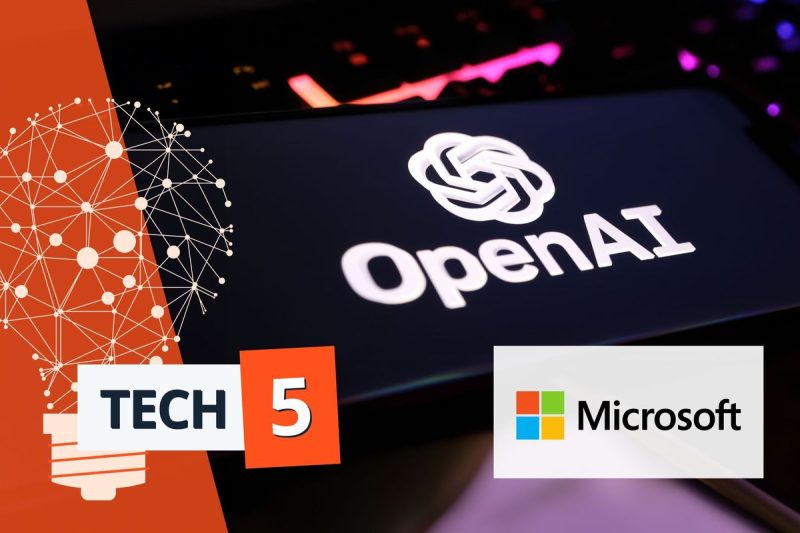This week, Microsoft (NASDAQ:MSFT) and OpenAI’s once tight alliance showed signs of strain, while Meta Platforms (NASDAQ:META) continued to source artificial intelligence (AI) talent from rival companies.
Meanwhile, SoftBank’s (TSE:9434) CEO is considering a new chip and robotics venture in Arizona, and Google (NASDAQ:GOOGL) is looking to bring AI solutions to American cities.
Read on to dive deeper into this week’s top tech stories.
1. OpenAI and Microsoft partnership faces tension
Microsoft and OpenAI’s once-close partnership is reportedly entering a tense period of renegotiation as OpenAI restructures into a public-benefit company and seeks more autonomy.
According to sources for The Information, recent negotiations have centered on reducing Microsoft’s long-term revenue share in exchange for a 33 percent stake in the newly formed entity. Additionally, OpenAI would like to limit Microsoft’s access to future models such as Windsurf, which OpenAI acquired in May.
The company has competitive concerns with Microsoft’s GitHub Copilot, according to the people.
Tensions have risen enough that some OpenAI executives are even weighing antitrust action against Microsoft, according to sources for the Wall Street Journal. In a joint statement, both companies maintained they want to continue working together; however, the Financial Times reported on Wednesday (June 18) that if they can’t reach an agreement, Microsoft is prepared to walk away and rely on its existing contract with the startup, which extends until 2030.
2. SoftBank floats trillion-dollar robotics hub in Arizona
SoftBank is reportedly interested in a trillion-dollar infrastructure project and has reached out to Taiwan Semiconductor Manufacturing Company (NYSE:TSM) as a potential collaborative partner.
Sources for Bloomberg revealed on Friday (June 20) that SoftBank founder Masayoshi Son has approached the Taiwanese chipmaker to play a “prominent role” in a manufacturing park in Arizona codenamed “Project Crystal Land,” which may serve as a major production facility for AI-powered industrial robots.
The sources said SoftBank has also approached Samsung Electronics (KRX:005930) and other companies with the idea. SoftBank officials have reportedly engaged in discussions with federal and state government officials, including US Secretary of Commerce Howard Lutnick, to explore potential tax incentives for companies onshoring high-tech manufacturing.
In other semiconductor news, Texas Instruments (NASDAQ:TXN) said on Wednesday that it will spend more than US$60 billion building seven new semiconductor facilities across the US. Meanwhile, Amazon (NASDAQ:AMZN) announced over the weekend that it will invest AU$20 billion to expand data center infrastructure in Australia by 2029.
3. Intel reportedly planning sizeable layoffs
Intel (NASDAQ:INTC) is reportedly set to implement substantial layoffs, impacting 15 to 20 percent of its factory workforce, according to an internal memo distributed on Saturday (June 14) and obtained by the Oregonian.
This move comes amidst continuing efforts to overhaul a company lagging behind its peers.
For some time, Intel’s offerings have struggled to compete effectively against those of key rivals in the highly competitive market of AI products and chip divisions. In a concerted effort to address this gap and reinvigorate its innovation pipeline, Intel has also been actively recruiting top-tier engineering talent.
On Wednesday, Intel expanded its sales and engineering leadership team to include experienced professionals from Cadence Design Systems (NASDAQ:CDNS), Apple (NASDAQ:AAPL) and Google.
These strategic hires are intended to inject fresh perspectives and expertise into crucial engineering departments, directly contributing to the company’s ambitious plans to develop more competitive and advanced AI solutions.
4. Google partners with Conference of Mayors for city AI strategies
On Friday, Google announced that it has partnered with the US Conference of Mayors to help speed the adoption of city-wide AI strategies. With the announcement, the company released a playbook titled A Roadmap for America’s Mayor that provides a framework for city leaders to develop and host an “AI Adoption Workshop,’ which would be structured to help cities identify and explore how AI can support specific needs, drawing on experiences from other communities.
The roadmap suggests cities conduct a general survey to tailor workshop content by gathering information on current AI usage, as well as concerns and ideas for AI applications. Various approaches are suggested for drafting the strategy document, including a dedicated working group, an appointed lead drafter, a hybrid model or engaging external expertise, with a recommended deadline of four to six weeks post-workshop for the first draft.
5. Meta hires top AI talent
Sources for the Information indicated on Wednesday that Meta CEO Mark Zuckerberg is bringing Daniel Gross, CEO of Ilya Sutskever’s startup Safe Superintelligence, and former GitHub CEO Nat Friedman onboard.
According to the report, Gross and Friedman will both join Meta, with Gross leaving his startup to focus on AI products at Meta and Friedman taking on a broader role. Both are expected to work directly with Zuckerberg and Scale AI CEO Alexandr Wang, who signed a US$14.3 billion deal to join Meta last week.
In exchange, Meta will get a stake in NFDG, the venture capital firm co-owned by Gross and Friedman that has backed companies such as Coinbase Global (NASDAQ:COIN), Figma, CoreWeave (NASDAQ:CRWV), Perplexity and Character.ai.
On the most recent episode of his brother’s “Uncapped” podcast, OpenAI CEO Sam Altman said that Meta has also offered signing bonuses as high as US$100 million and large compensation packages to OpenAI employees.
Securities Disclosure: I, Meagen Seatter, hold no direct investment interest in any company mentioned in this article.
